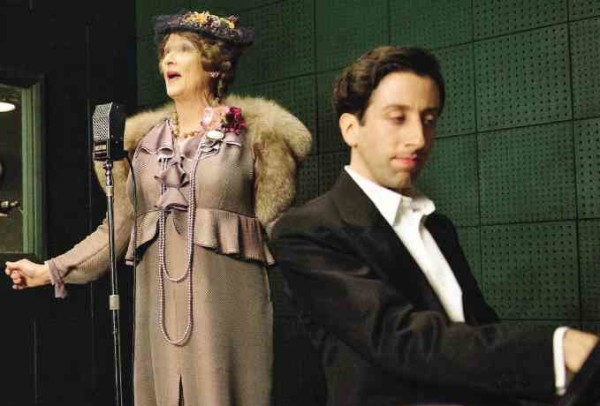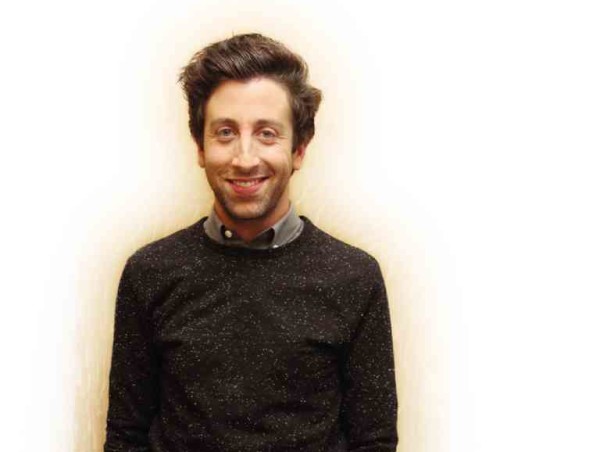‘Big Bang Theory’ actor holds his own opposite Meryl Streep
LOS ANGELES—You heard it here first: “The Big Bang Theory’s” Simon Helberg should be a best supporting actor contender come awards season for his portrayal of a pianist opposite Meryl Streep in “Florence Foster Jenkins.”
It’s no mean feat for an actor sharing the screen with the iconic Meryl to hold his own, but Simon does it in Stephen Frears’ “Florence Foster Jenkins.” Upon hearing this compliment, Simon quipped, “You’re very kind. I’m very handsome—that goes a long way.”
The film depicts the true story of Florence (played by Meryl), a New York heiress who infamously had concerts despite her appalling voice in the 1940s, backed by her pianist, Cosme McMoon (Simon), and managed by her pseudo-husband, St. Clair Bayfield (Hugh Grant, just as wonderful).
In his first major film role, Simon, usually seen as the bowl-cut geek Howard Wolowitz in “The Big Bang Theory,” is a delightful counterpoint to Meryl’s socialite with the atrocious singing voice. Through Simon’s Cosme, we identify with his hilarious reaction when he hears Florence sing for the first time.
Simon, who turns out to have some experience playing the piano but his forte was jazz, learned to play opera pieces for the film. He’s actually the one backing Meryl on the keyboards as she “murders” the opera arias. Florence was blissfully unaware about what people actually thought of her voice until she sings at Carnegie Hall.
Funny in person as well, Simon is a true-blue Los Angeleno, born and raised in the Hollywood milieu, with an actor (Sandy Helberg) and a casting director (Harriet Helberg) as parents. He went to a prep school with Jason Ritter, who also became his roommate at New York University’s Tisch School of the Arts.
Simon, who is 35, is married to actress Jocelyn Towne, with whom he has two kids, Adeline, 4, and Wilder, 2.
Excerpts from our recent chat at Conrad New York Hotel:
What was it like the first time you heard Meryl sing very badly?
It’s hard to imagine Meryl doing anything badly, so I thought they were going to struggle with that. But she did do it really badly, but also beautifully at the same time.
We played, and it sounded awful—we knew that we had a hit. It was an amazing moment.
What were your rehearsals like?
There was something that early on, we decided to do together, which was to be loyal to the recordings initially, listen to them and transcribe them, and try to understand the relationship of these two people through the recordings.
We recorded all of the music live, so everything you’re seeing is happening in reality.
How did she put you at ease?
We got to be very close during the filming. My daughter (Adeline) had seen some of “Mamma Mia!” So my daughter came to Abbey Road Studios.
Meryl comes in wearing a tiara, and sat down to get on my daughter’s level. She said, “Hello, I’m Meryl Streep.”
She took off her tiara and put it on my daughter. That, metaphorically, was like a “Game of Thrones” moment.
My daughter has the highest standards of any 3-year-old you’ve ever met now.
How much experience playing the piano did you have before this role came along?
I do play the piano. But I had never played opera or classical music.
I just lied to Stephen Frears. He asked if I could play opera, and I knew that Meryl Streep was on the other side of that question. So I said, “Sure!” Then, I had to learn it all and play in front of her and the great Stephen Frears.
What made you change your career aspirations, from pianist to actor?
Foolishness. I thought, I’ll be an actor, and my backup job will be jazz pianist because that’s a safety net.
Did you have to audition for this role?
No, I didn’t have to audition, which is amazing, crazy and everything you could hope for.
The other odd part of it is that Stephen Frears did not know who I was.
But the casting director, Kathleen Chopin, had done this very small film that I did a year before. She just thought of me and set up a meeting.
We (he and Frears) just talked about music.
How long did you wait before you learned that you got the part?
Not that long. A couple of weeks went by. He didn’t know the show (“The Big Bang Theory”).
I sent Stephen a tape of me playing Mozart and tried to make it look effortless so he’d know I could play the piano.
The film revolves around Florence being shielded from the truth.
I’ve been lying since I got here.
Do you tell white lies—to your wife, for example?
I haven’t said an honest word since the day we got married. The moral dilemma is, is it better to tell the truth if lying ultimately makes someone happier, or if telling the truth would destroy them, or if telling the truth is only something that would help alleviate your guilty conscience?
How has fatherhood changed you? Hugh Grant said that he understood his character because being a father has taught him about unconditional love.
I’ll piggyback on Hugh’s answer, because that is another big part of this film and my character, too, in terms of moral ambiguity and suspending judgment, which as a parent, I’m sure you know.
When you watch your child belt out a song from “The King and I,” “The Lion King” or anything with “king,” or dance naked, or whatever it might be, I don’t in any way have a context for what that should sound or look like. I don’t feel any judgment or anything but pride.
Did you and Hugh hang out?
We arm-wrestled. There was a terrible penalty for the person who lost. I realized that Hugh, much like myself, is neurotic to the point of almost absurdity.
We basically had a battle of the insecure neurotic minds, which is funny, because he’s so charming and charismatic.
In your research about Cosme, what did you find out about him?
Nicholas Martin wrote everything that you see onscreen. I … [credit] him and Stephen to bringing these people to life. They’re based on real people, but there’s not a lot of information about them.
You get a good taste of it from what’s onscreen—there’s definitely quite a bit of insinuation that my character was gay.
At the time, that was definitely forbidden and illegal in many cases. My character was born in Mexico, moved to Texas, then to New York.
After Florence died, what happened to Cosme and his pianist career?
That was the peak of his creative life. He taught piano and some of his students played at Carnegie Hall for recitals. As far as I know, he worked in a bathhouse at one point. He judged amateur bodybuilding competitions.
“The Big Bang Theory” continues to be a hit. What can we expect from your character?
He (Howard) has to grow up, hopefully. He’s become the first to get married and to have a child.
How has the show changed your life?
“The Big Bang Theory” is probably why I’m sitting here today … We’ve done over 200 episodes. People across the world watch it.
It has given me, as an actor, a great opportunity to work all the time, to put on a little play every week and do it in front of an audience.
E-mail rvnepales_5585@yahoo.com. Follow him at https://twitter.com/nepalesruben.

